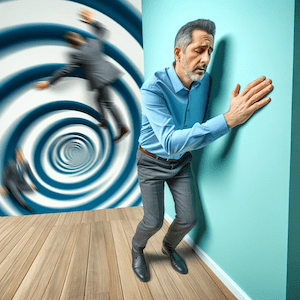Article by Shane Armfield
Discussing Dizziness & Vertigo Causes
Understanding Vertigo Causes: How to Find Balance Again

Battling Vertigo and Dizziness
Experiencing vertigo or dizziness can make everyday tasks feel overwhelming. These sensations can disrupt your life, making it difficult to walk, drive, or even stand without feeling off-balance. Identifying the causes behind vertigo and dizziness is crucial to regaining stability and returning to your normal routine.
Common Causes of Vertigo and Dizziness
Inner Ear Disorders
Vertigo often originates from problems within the inner ear. Some common conditions include:
- Benign Paroxysmal Positional Vertigo (BPPV): This occurs when tiny crystals in your ear canal become dislodged, leading to sudden and brief episodes of dizziness.
- Meniere’s Disease: Characterised by a fluid imbalance in the inner ear, Meniere’s disease can cause vertigo, tinnitus, and hearing loss.
- Vestibular Neuritis or Labyrinthitis: These conditions result from inner ear infections that cause inflammation and lead to vertigo.
Cervicogenic Dizziness
Another significant cause is cervicogenic dizziness, which stems from neck issues. Problems in the neck can interfere with sensory signals to the brain, resulting in dizziness. This type of dizziness is often overlooked but is crucial to recognise for effective treatment.
Other Causes of Dizziness
Dizziness can also arise from various other sources, including:
- Low Blood Pressure: Sudden drops in blood pressure can cause light-headedness.
- Medications: Some medications list dizziness as a potential side effect.
- Anxiety or Stress: High stress levels can lead to episodes of dizziness.
Diagnosing Vertigo and Dizziness
Understanding the root causes of vertigo and dizziness helps healthcare professionals tailor treatments to reduce or eliminate these symptoms. This process may involve a series of diagnostic tests to pinpoint the exact cause, ensuring a more effective treatment plan.
Treatment Options
Vestibular Physiotherapy
Vestibular physiotherapy can significantly improve symptoms of vertigo and dizziness. This specialised therapy focuses on exercises and techniques that help retrain the brain and improve balance. It's especially beneficial for conditions like BPPV and Meniere’s disease.
Medical Treatments
In some cases, medication may be prescribed to manage symptoms or treat underlying conditions. For instance, medications can reduce inner ear inflammation or manage anxiety-related dizziness.
Lifestyle Changes
Making certain lifestyle adjustments can also help. Reducing salt intake can manage Meniere’s disease, while regular exercise and stress management techniques can alleviate anxiety-induced dizziness.
Conclusion
Determining the causes of vertigo and dizziness can be complex. While many causes are benign and manageable, some may indicate more serious conditions. It's essential to consult a healthcare professional for an accurate diagnosis and appropriate treatment plan. Vestibular specialists, including ENT doctors and vestibular physiotherapists, can guide you towards a more stable and balanced life.
What to Do?
If vertigo or dizziness is impacting your life, consider booking an appointment with a physiotherapist. They can assess your symptoms and provide tailored advice. For more information on managing vertigo and dizziness, explore our Vestibular Physiotherapy section and FAQs.
Vertigo FAQs
- What is vertigo? Vertigo is a sensation of spinning or dizziness, often caused by inner ear problems.
- What causes vertigo? Common causes include BPPV, Meniere’s disease, vestibular neuritis, vestibular migraine and cervicogenic dizziness.
- How is vertigo diagnosed? Diagnosis involves a physical examination, medical history review, and specific tests like the Dix-Hallpike maneuver. Consult your physiotherapist or doctor.
- Can stress cause vertigo? Yes, high stress and anxiety can lead to dizziness and vertigo episodes.
- What is the treatment for vertigo? Treatments include vestibular physiotherapy, medications, and lifestyle changes such as reducing salt intake.
- When should I see a doctor or physiotherapist for vertigo? If vertigo significantly impacts your daily life or is accompanied by other symptoms like hearing loss or severe headaches, seek medical advice.
Related Articles
- Cervicogenic Dizziness & Cervical Vertigo - Tips & Treatment: Readers will find detailed explanations about how neck disorders can lead to dizziness and vertigo.
- Vertigo & Dizziness: This article offers a broad overview of dizziness and vertigo, providing insights into their differences and potential causes.
- Vestibular Physiotherapy: Balance & Dizziness Solutions: Explore how vestibular physiotherapy can help manage and treat balance issues and dizziness.
- What Are The Four Types Of Dizziness?: Readers will learn about the four distinct types of dizziness and their respective causes and symptoms.
- Meniere's Disease: An in-depth look at Meniere's Disease, offering insights into its symptoms, diagnosis, and management.
- Vestibular Migraine: This page discusses vestibular migraines, highlighting their unique challenges in diagnosis and treatment.
- Neck Pain: Find comprehensive information on the various causes of neck pain and its relationship to dizziness and vertigo.
- What Are The Symptoms Of BPPV?: An article detailing the symptoms of Benign Paroxysmal Positional Vertigo (BPPV), helping readers to better understand this condition.
- Vestibular FAQs: Offers answers to frequently asked questions about vertigo and dizziness, enhancing understanding of these conditions.
- Vertigo Causes & Dizziness Causes - Advice & Managing Tips: Provides information on the various causes of vertigo and dizziness, along with tips for managing these conditions.



